Are you looking for the best way to keep your crypto assets secure? Choosing the right crypto wallet is crucial, and with so many options available, it can be overwhelming. This article will guide you through the top 10 crypto wallets designed to safeguard your digital investments. We’ll explore features, security measures, and user-friendliness to help you find the perfect cryptocurrency wallet for your needs, whether you’re a seasoned trader or just starting your crypto journey. Learn how to protect your Bitcoin, Ethereum, and other digital assets with our expert recommendations for the most secure and reliable crypto wallets in 2024.
Ledger Nano X
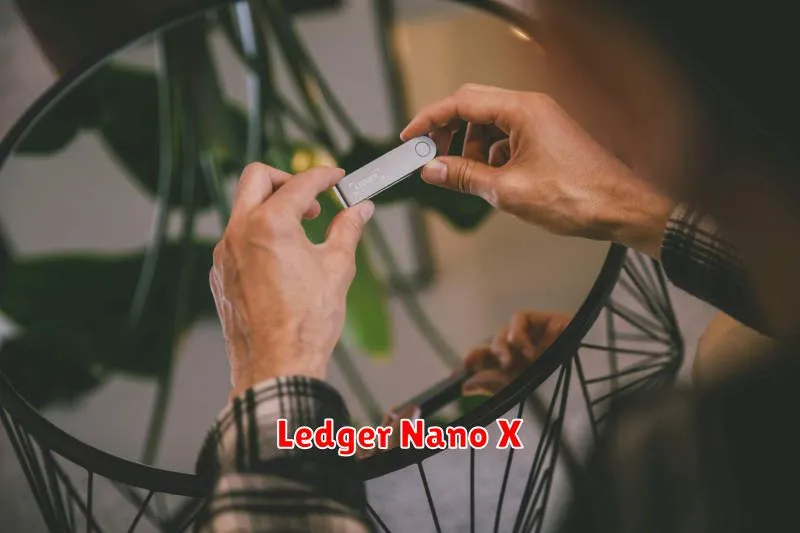
The Ledger Nano X is a popular and highly-rated hardware wallet known for its robust security features and user-friendly interface. It’s a significant step up from its predecessor, the Nano S, offering Bluetooth connectivity for easier interaction with your smartphone and a larger screen for improved navigation.
Security is paramount with the Nano X. It uses a secure element chip to protect your private keys, making it exceptionally resistant to hacking attempts, even phishing attacks. This offline storage of your crypto assets is a crucial element of its security strategy.
The device supports a wide range of cryptocurrencies, making it a versatile choice for managing diverse portfolios. Its intuitive design, coupled with the Ledger Live application, allows for relatively easy management of your digital assets. While slightly more expensive than some software wallets, the added security and convenience make it a worthwhile investment for many users.
However, it’s crucial to remember that while the Ledger Nano X offers excellent security, maintaining good security practices, such as using strong passphrases and being aware of potential phishing scams, remain your responsibility. Never share your recovery phrase with anyone.
Trezor Model T
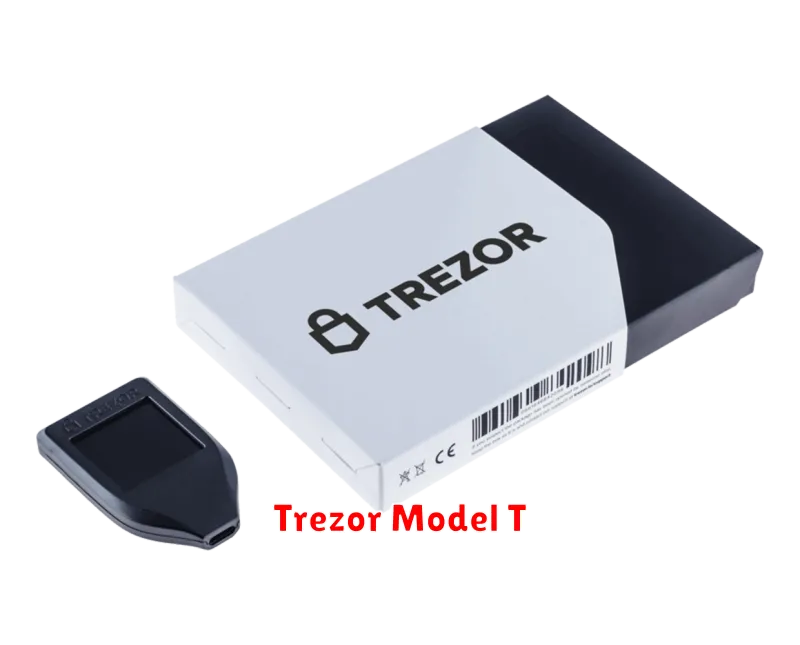
The Trezor Model T is a premium hardware wallet offering a high level of security for your cryptocurrency. Its large touchscreen allows for easy navigation and confirmation of transactions, minimizing the risk of errors. This contrasts with button-only devices, making it more user-friendly.
Security is paramount with the Model T. It features a secure element chip to protect your private keys, even if the device itself is compromised. The open-source firmware ensures transparency and allows for community scrutiny, enhancing trust and security.
Beyond its strong security features, the Model T also boasts support for a wide range of cryptocurrencies and offers advanced features such as passphrase protection for added security. While it comes at a higher price point than some other options, the enhanced security and user experience make it a worthwhile investment for those prioritizing the safekeeping of significant crypto holdings.
Exodus Wallet
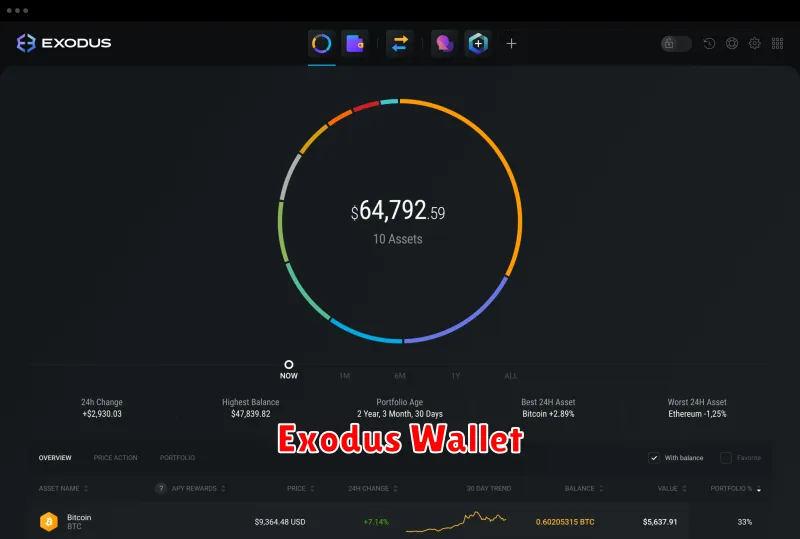
Exodus is a multi-currency wallet known for its user-friendly interface and attractive design. It supports a wide range of cryptocurrencies and offers both desktop and mobile applications.
One of Exodus’s key features is its built-in exchange, allowing users to buy, sell, and swap cryptocurrencies directly within the wallet. This simplifies the trading process for those new to crypto.
Security is a primary concern for Exodus. While it uses a combination of methods to protect user funds, it’s crucial to remember that users are responsible for safeguarding their seed phrase. Losing this phrase means losing access to your crypto assets.
While Exodus offers a convenient and visually appealing experience, potential users should research its security features thoroughly and weigh them against other wallet options before making a decision.
Trust Wallet
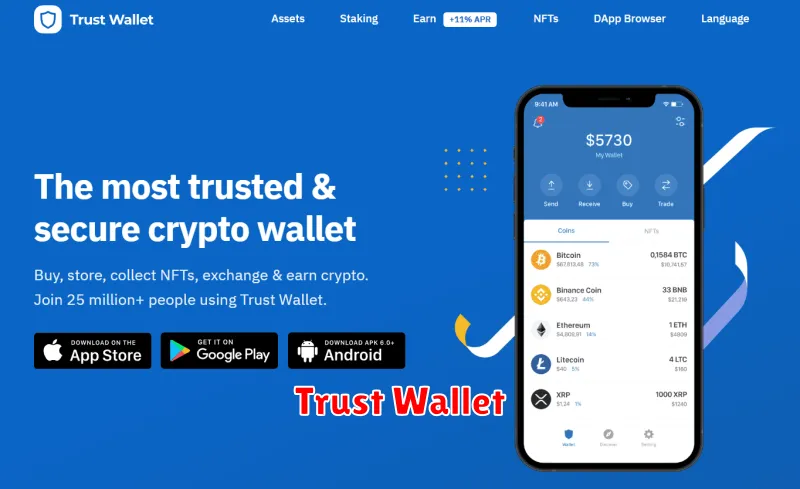
Trust Wallet is a popular and user-friendly mobile cryptocurrency wallet. It’s known for its easy-to-use interface and its support for a wide range of cryptocurrencies and tokens, including Binance Chain assets.
A key feature is its built-in decentralized exchange (DEX) functionality, allowing users to trade various cryptocurrencies directly within the app. This eliminates the need to transfer assets to external platforms for trading.
Security features include 12-word seed phrase backup and the ability to store private keys directly on your device. However, users should be aware of the risks associated with storing private keys on mobile devices and consider using a hardware wallet for larger holdings.
Overall, Trust Wallet offers a convenient and accessible solution for managing a diverse crypto portfolio, but users should prioritize strong security practices to protect their assets.
Coinbase Wallet
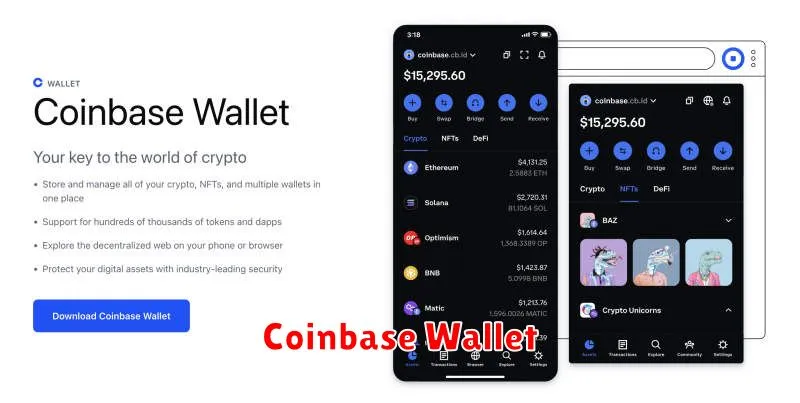
Coinbase Wallet is a self-custody wallet, meaning you are in complete control of your private keys. This differs from Coinbase’s exchange service, where they hold your assets. It supports a wide range of cryptocurrencies and offers a user-friendly interface.
Security is a key feature. Your private keys are stored locally on your device, providing a high level of security against hacking and theft. However, losing your device or forgetting your seed phrase means losing access to your funds.
Key features include support for both ERC-20 and BEP-20 tokens, making it compatible with many popular DeFi applications. It also offers integration with dApps (decentralized applications) and allows for easy sending and receiving of cryptocurrencies.
Ease of use is another strong point. The intuitive design makes it accessible even to beginners. However, users need to understand the responsibility that comes with managing their own private keys. A lack of understanding here can lead to irreversible loss of assets.
Overall, Coinbase Wallet provides a strong balance of user-friendliness, security, and functionality, making it a solid choice for managing your crypto assets. But remember, responsible self-custody requires diligence and awareness of security best practices.
MetaMask

MetaMask is a popular and widely-used crypto wallet extension available for Chrome, Firefox, Brave, and Edge browsers, as well as mobile apps for iOS and Android. Its user-friendly interface makes it accessible to both beginners and experienced crypto users.
One of its key strengths is its integration with decentralized applications (dApps). This allows users to easily interact with various blockchain platforms and participate in DeFi activities directly from their browser.
MetaMask offers secure storage for your private keys, although it’s crucial to remember that the security of your assets ultimately depends on your own practices, such as using a strong password and enabling two-factor authentication (2FA).
While generally considered secure, users should always be aware of potential phishing scams and only interact with verified dApps. Regularly updating the MetaMask extension is also essential for maintaining optimal security.
In summary, MetaMask provides a convenient and relatively secure way to manage your cryptocurrency assets, especially for users engaging with the decentralized web. However, responsible security practices remain vital for safeguarding your holdings.
Atomic Wallet

Atomic Wallet is a non-custodial cryptocurrency wallet, meaning you retain complete control over your private keys. This offers a high degree of security as your assets are not held by a third party. It supports a wide range of cryptocurrencies, allowing you to store and manage various digital assets in one place.
Key features include a user-friendly interface, built-in exchange for swapping cryptocurrencies, and support for staking certain coins to earn passive income. The wallet is available as a desktop app, mobile app (Android and iOS), and browser extension, providing flexibility for access.
While generally considered secure due to its non-custodial nature, it’s crucial to practice good security habits like using a strong password and enabling two-factor authentication (2FA) to maximize protection. Like all wallets, be aware of phishing scams and only download the official Atomic Wallet app from reputable sources.
In summary, Atomic Wallet offers a convenient and relatively secure option for managing a diverse cryptocurrency portfolio. However, users should prioritize security best practices to mitigate risks associated with self-custody.
Electrum Wallet
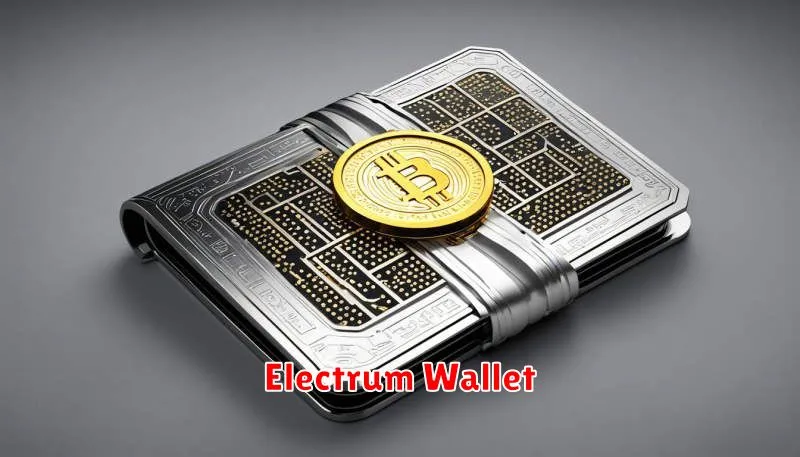
Electrum is a popular and lightweight Bitcoin wallet known for its security and speed. Unlike many wallets, it doesn’t download the entire blockchain, making it quicker to set up and use.
Key features include its open-source nature, allowing for community scrutiny, and support for hardware wallets, enhancing security. Its user-friendly interface makes it accessible to beginners, while its advanced features cater to experienced users. However, Electrum’s focus is solely on Bitcoin; it doesn’t support other cryptocurrencies.
Security is a major selling point. Electrum employs robust encryption and allows for the use of seed phrases, providing users with complete control over their private keys. It also offers features like two-factor authentication for added protection. Remember, though, that responsible security practices, like choosing strong passwords and keeping your seed phrase secure, remain crucial.
Overall, Electrum is an excellent choice for users prioritizing Bitcoin security and speed, particularly those comfortable managing their own private keys. Its simplicity and robustness make it a solid contender in the crypto wallet landscape.
Binance Wallet
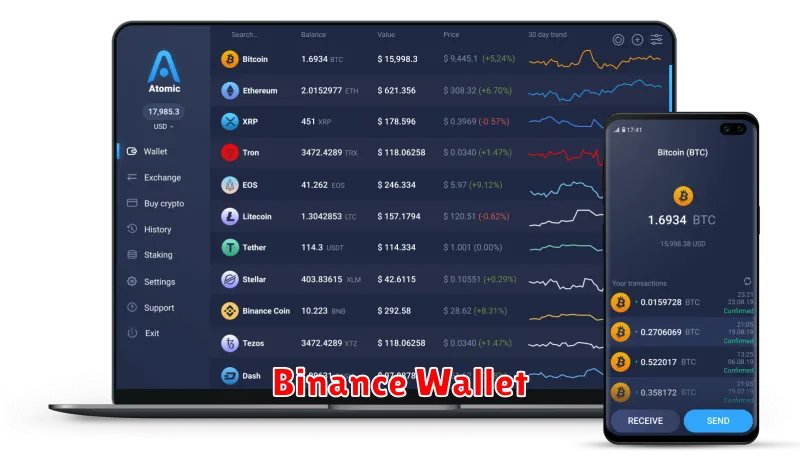
The Binance Wallet, integrated within the popular Binance exchange, offers a convenient option for storing your crypto assets. It provides easy access to trading features directly within the platform. However, it’s crucial to understand that because it’s a custodial wallet, Binance holds the private keys to your assets. This means you are relying on their security measures, making it potentially less secure than self-custody options.
Security features vary, and Binance constantly updates its systems. It offers features like two-factor authentication (2FA) and various security protocols to protect against unauthorized access. Nevertheless, users should carefully consider the trade-off between convenience and security when choosing this option. Always enable the highest level of security settings available.
It’s important to note that while Binance offers a user-friendly experience, keeping your cryptocurrency on an exchange is generally considered riskier than using a hardware wallet or a software wallet you fully control. Consider your personal risk tolerance when deciding where to store your digital assets.
MyEtherWallet (MEW)
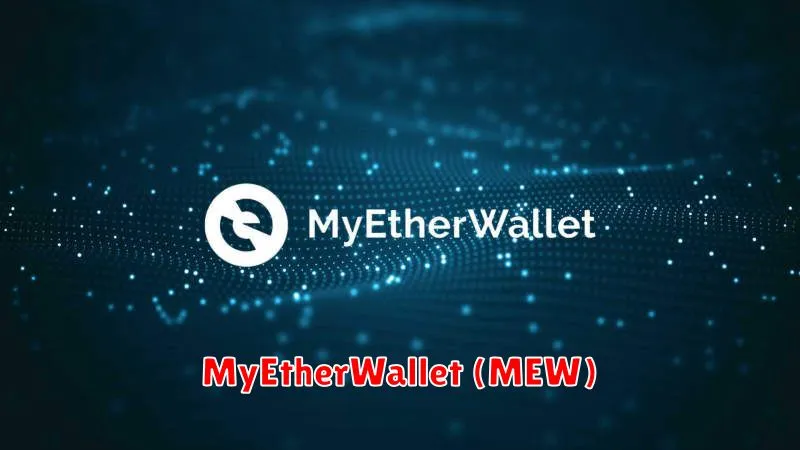
MyEtherWallet (MEW) is a popular, free, open-source Ethereum wallet. It’s a web-based wallet, meaning you access it through a browser, not a downloadable app. This offers convenience but requires extra caution regarding website security.
Key Features: MEW allows users to interact directly with the Ethereum blockchain, offering full control over their private keys. This is a significant advantage for users who prioritize security and want to manage their assets without relying on third-party custody. However, it also necessitates a high level of technical understanding.
Security Considerations: Because MEW is web-based, users are responsible for ensuring they’re using the legitimate website to prevent phishing attacks. Never enter your private key or seed phrase into any site unless you are 100% certain of its legitimacy. Incorrectly handling your private keys will result in the loss of your funds.
Overall: MEW is a powerful tool for experienced users who value control and transparency. However, its web-based nature and reliance on user responsibility make it less suitable for beginners. Thorough understanding of cryptocurrency security best practices is crucial before using MEW.

